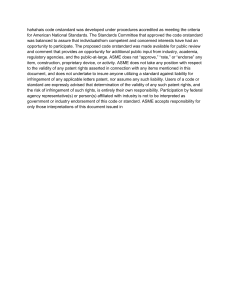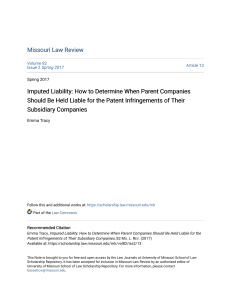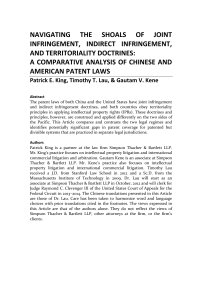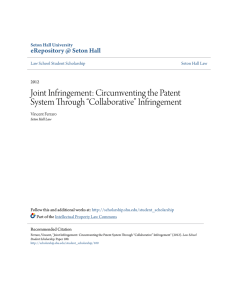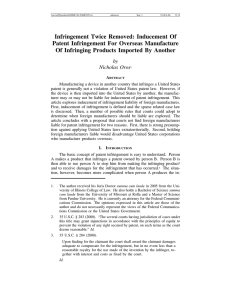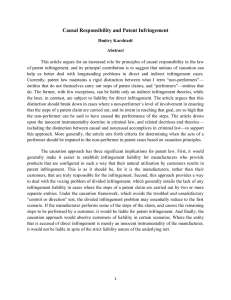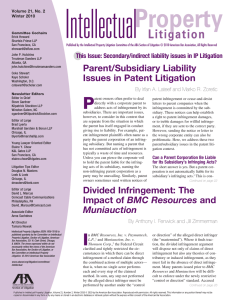LIABILITY FOR EXTERRITORIAL OFFERS TO SELL by Peter J
advertisement
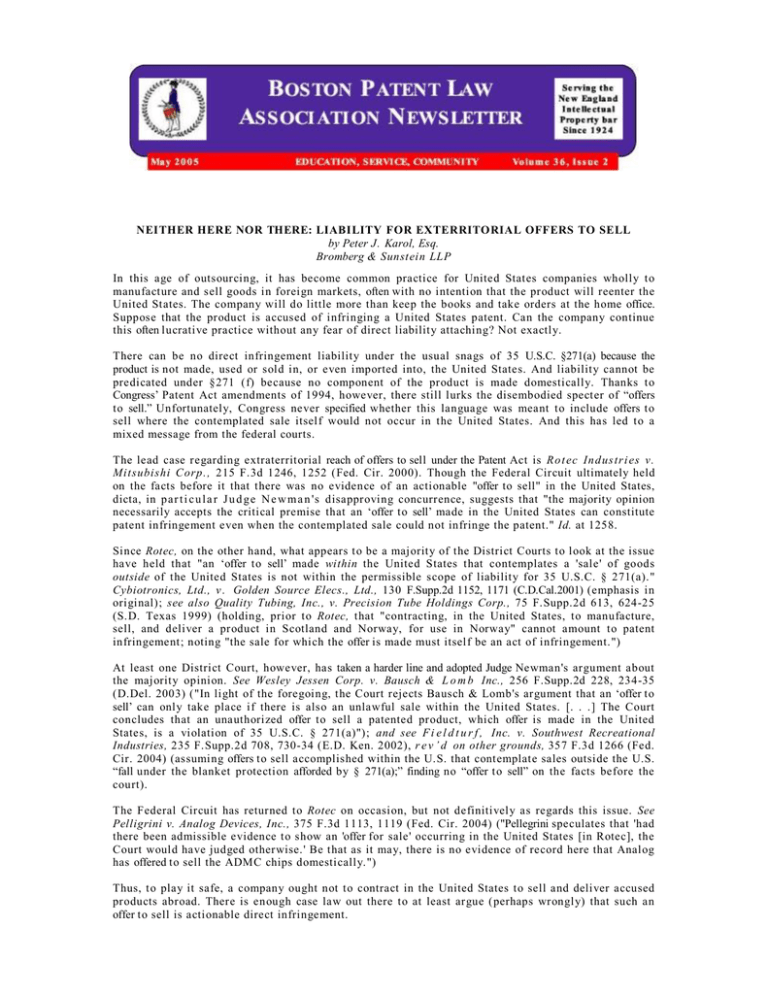
NEITHER HERE NOR THERE: LIABILITY FOR EXTERRITORIAL OFFERS TO SELL by Peter J. Karol, Esq. Bromberg & Sunstein LLP In this age of outsourcing, it has become common practice for United States companies wholly to manufacture and sell goods in foreign markets, often with no intention that the product will reenter the United States. The company will do little more than keep the books and take orders at the home office. Suppose that the product is accused of infringing a United States patent. Can the company continue this often lucrative practice without any fear of direct liability attaching? Not exactly. There can be no direct infringement liability under the usual snags of 35 U.S.C. §271(a) because the product is not made, used or sold in, or even imported into, the United States. And liability cannot be predicated under §271 (f) because no component of the product is made domestically. Thanks to Congress’ Patent Act amendments of 1994, however, there still lurks the disembodied specter of “offers to sell.” Unfortunately, Congress never specified whether this language was meant to include offers to sell where the contemplated sale itself would not occur in the United States. And this has led to a mixed message from the federal courts. The lead case regarding extraterritorial reach of offers to sell under the Patent Act is Ro t ec In d us tr i es v. Mitsubishi Corp ., 215 F.3d 1246, 1252 (Fed. Cir. 2000). Though the Federal Circuit ultimately held on the facts before it that there was no evidence of an actionable "offer to sell" in the United States, dicta, in p a r t i c u l a r J u d g e N e w m a n 's disapproving concurrence, suggests that "the majority opinion necessarily accepts the critical premise that an ‘offer to sell’ made in the United States can constitute patent infringement even when the contemplated sale could not infringe the patent." Id. at 1258. Since Rotec, on the other hand, what appears to be a majority of the District Courts to look at the issue have held that "an ‘offer to sell’ made within the United States that contemplates a 'sale' of goods outside of the United States is not within the permissible scope of liability for 35 U.S.C. § 271(a)." Cybiotronics, Ltd., v . Golden Source Elecs., Ltd., 130 F.Supp.2d 1152, 1171 (C.D.Cal.2001) (emphasis in original); see also Quality Tubing, Inc., v. Precision Tube Holdings Corp., 75 F.Supp.2d 613, 624-25 (S.D. Texas 1999) (holding, prior to Rotec, that "contracting, in the United States, to manufacture, sell, and deliver a product in Scotland and Norway, for use in Norway" cannot amount to patent infringement; noting "the sale for which the offer is made must itself be an act of infringement.") At least one District Court, however, has taken a harder line and adopted Judge Newman's argument about the majority opinion. See Wesley Jessen Corp. v. Bausch & L o m b Inc., 256 F.Supp.2d 228, 234-35 (D.Del. 2003) ("In light of the foregoing, the Court rejects Bausch & Lomb's argument that an ‘offer to sell’ can only take place if there is also an unlawful sale within the United States. [. . .] The Court concludes that an unauthorized offer to sell a patented product, which offer is made in the United States, is a violation of 35 U.S.C. § 271(a)"); and see F i e l d t u r f , Inc. v. Southwest Recreational Industries, 235 F.Supp.2d 708, 730-34 (E.D. Ken. 2002), r e v ’ d on other grounds, 357 F.3d 1266 (Fed. Cir. 2004) (assuming offers to sell accomplished within the U.S. that contemplate sales outside the U.S. “fall under the blanket protection afforded by § 271(a);” finding no “offer to sell” on the facts before the court). The Federal Circuit has returned to Rotec on occasion, but not definitively as regards this issue. See Pelligrini v. Analog Devices, Inc., 375 F.3d 1113, 1119 (Fed. Cir. 2004) ("Pellegrini speculates that 'had there been admissible evidence to show an 'offer for sale' occurring in the United States [in Rotec], the Court would have judged otherwise.' Be that as it may, there is no evidence of record here that Analog has offered to sell the ADMC chips domestically.") Thus, to play it safe, a company ought not to contract in the United States to sell and deliver accused products abroad. There is enough case law out there to at least argue (perhaps wrongly) that such an offer to sell is actionable direct infringement.
